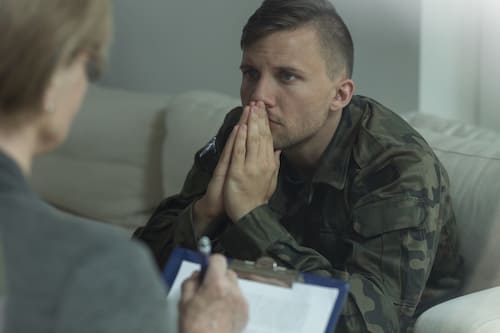September 25, 2019
If you or someone you know is experiencing a mental health, suicide or substance use crisis or emotional distress, reach out 24/7 to the 988 Suicide and Crisis Lifeline (formerly known as the National Suicide Prevention Lifeline) by dialing or texting 988 or using chat services at 988lifeline.org to connect to a trained crisis counselor. You can also get crisis text support via the Crisis Text Line by texting NAMI to 741741.
 Despite progress, suicide rates are still unacceptably high. Suicide is currently the second most common cause of death among college students. The veteran suicide rate is 1.5 times greater than the rest of the population. First responders are more likely to die by suicide than in the line of duty.
Despite progress, suicide rates are still unacceptably high. Suicide is currently the second most common cause of death among college students. The veteran suicide rate is 1.5 times greater than the rest of the population. First responders are more likely to die by suicide than in the line of duty.
If we are to improve existing prevention efforts, the many lives at risk should be taken seriously.
Here are ways we can improve suicide prevention.
Spread Awareness
For a long time, stigma has made preventing suicide difficult because it is frequently misunderstood. By continuing to educate the general public, we can reduce the effects of harmful stereotypes, false assumptions and discrimination. Reducing stigma can help more people feel comfortable seeking the treatment they need.
Promote Acceptance
If a person is bullied, doesn’t receive enough acceptance or emotional support, they may be discouraged from social contact. This can cause them to internalize their stress. When treatment is needed, stigma can dissuade people from believing it will help, potentially leading to an increased suicide risk. It is important to encourage those who are struggling to be open about how they are doing and to seek help when needed.
Change Harmful Terms
News and social media outlets have a strong impact on the perception of mental health and suicide. Each time it is misrepresented, much of the hard-fought progress toward awareness and prevention is set back. For example, the term “murder-suicide” is still repeatedly referenced in news reporting. Every use can inseparably associate suicide with aggressive violence, such as mass shootings. The majority of suicides only involve one person.
Stop Toxic Behavior
Two recent local suicides I heard about were both victims of harassment and bullying. One was a 45-year-old businesswoman. I can relate. As an adult, bullying has directly contributed to my persistent depression and anxiety symptoms. For my case, there has been no reconciliation or anyone held accountable to prevent it from happening again. The other victim was a 12-year-old student.
As I shared in my article, “It Matters How People Are Treated,” I was relentlessly teased in school. The harsh social isolation I endured still affects me to this day. By choosing not to tolerate, participate in or encourage any form of toxic behavior, you can help prevent symptoms from escalating to suicidal thoughts or behaviors.
Through connecting with my local chapter of Guardians of the Children, a non-profit organization supporting victims of child abuse, I have also seen how abusive behavior can be a major factor. Pre-teens and teens are especially vulnerable. Because of their young age, they have not developed effective coping skills yet. By preventing child abuse and providing effective support, children can be spared from long-term mental health symptoms.
Prioritize At-Risk Occupations
Certain occupations are more susceptible to suicide because they have to regularly confront highly stressful situations. Without proper care, these losses have steadily increased.
Military service demands exposure to remarkably strong stressors for veterans, active-duty and reserve personnel called upon to engage in combat. Once triggered, they can experience difficult mental health conditions, such as PTSD. Any physical disabilities caused by combat injuries further compounds their stress.
Valuable progress has been made to increase awareness, strengthen community support and improve treatment despite the challenging circumstances. Unfortunately, memories of traumatic experiences can remain with personnel and veterans long after serving active duty. We cannot afford to neglect their needs.
Additional occupations that face heightened stress include the three types of first responders: police, firefighters, EMTs and paramedics. Fear of and failing to save lives from harm, especially young children, can be deeply traumatic. Anxiety from appearing weak often causes first responders to internalize their acute stress. This can make them less likely to seek treatment.
First responders are crucial to saving lives on a daily basis. Employers should acknowledge the trauma risk and provide access to affordable mental health care. Additionally, if first responders receive more social support from those around them, especially when off-duty, it can help lessen the likelihood of suicide.
Share Your Story
When it comes to helping those who are struggling, an untapped source of direct experience already exists: survivors of attempted suicide. If a survivor is prepared and willing to share their story, there is no better resource than someone who has lived through this and survived. I know because I survived my own suicide attempt.
I have witnessed suicide prevention repeatedly fail over an extended period of time. I have seen limited awareness accomplished afterward. So I choose to draw the line at each painful loss, because nothing will bring them back. Suicide is preventable. Every second they could still be here is worth every breath I take as a survivor and each ounce of effort to persist as an advocate.
I am living proof that even attempt survivors can outlast harsh bullying and rise above stigma. In my heart, I know that how people are treated matters. Now, when our lives and our loved ones matter most, is the time to take suicide prevention more seriously.
There is Always Hope
If you or someone you know is experiencing mental health symptoms, especially suicide, hear my voice. We need you. Please, stay and live. Courage can be found all around you while you cope with your stress and seek out treatment. For all those no longer with us, please let their moments of silence continue to be heard loud and clear. Advocates like me will do everything we can to be your best source for hope. No one will be alone or forgotten, as long I can help.
Whatever it takes.
Jim R. Irion is a mental health advocate and a dedicated community service volunteer who focuses on empowerment and anti-bullying. Jim is currently a NAMI member, and is a trained NAMI In Our Own Voice presenter. He has also been trained in QPR Gatekeeper suicide prevention.
We’re always accepting submissions to the NAMI Blog! We feature the latest research, stories of recovery, ways to end stigma and strategies for living well with mental illness. Most importantly: We feature your voices.
Check out our Submission Guidelines for more information.
Submit To The NAMI Blog
We’re always accepting submissions to the NAMI Blog! We feature the latest research, stories of recovery, ways to end stigma and strategies for living well with mental illness. Most importantly: We feature your voices.
LEARN MORE